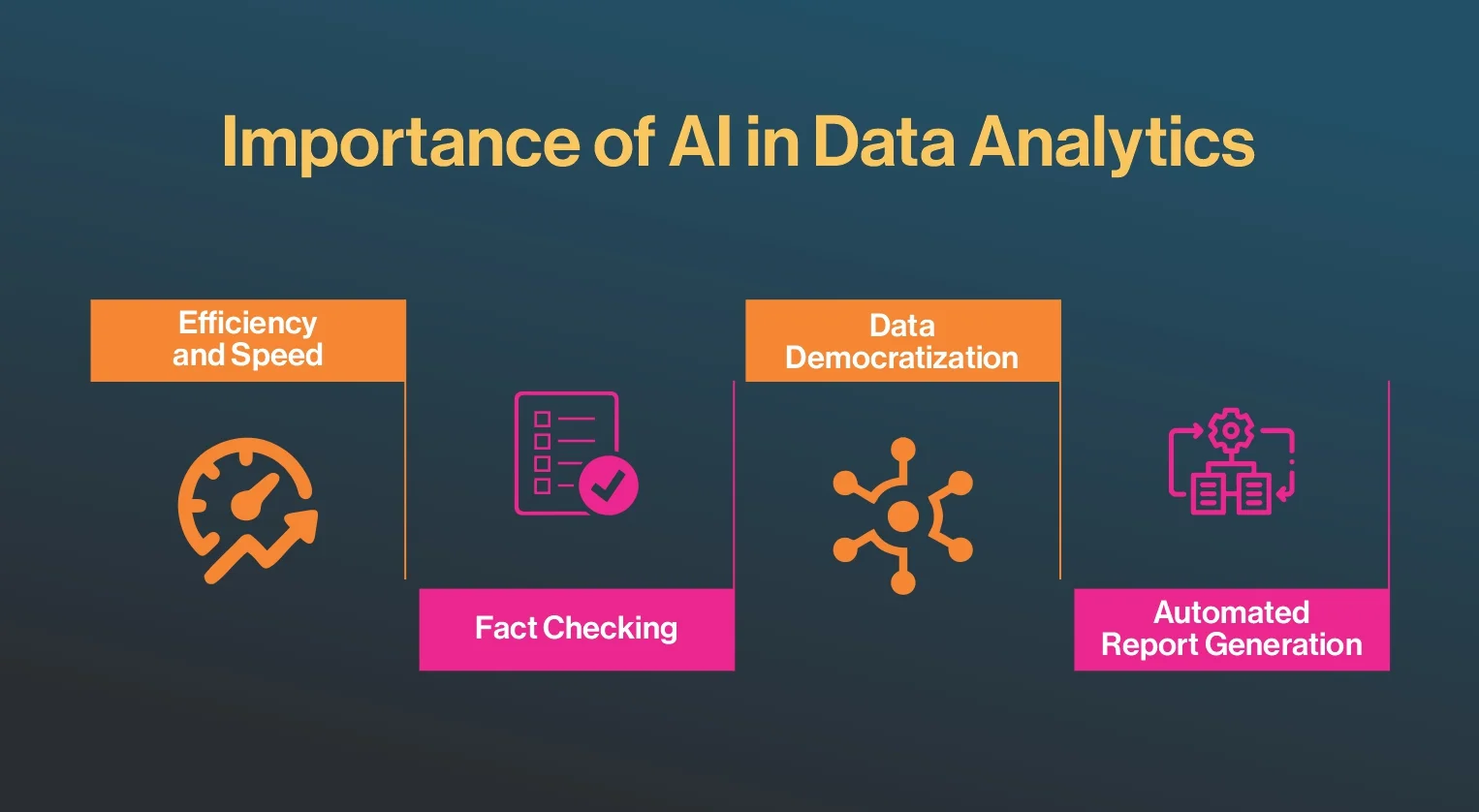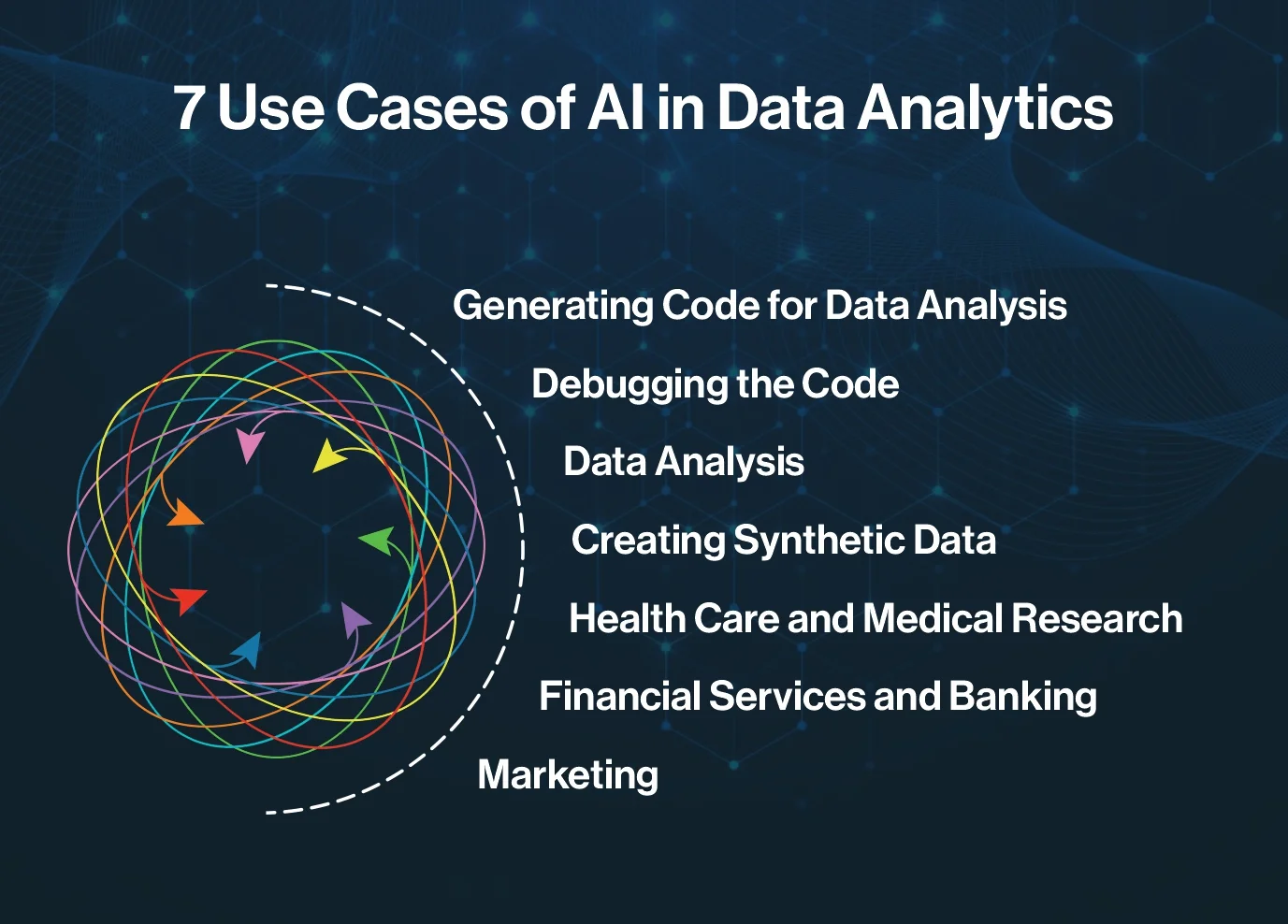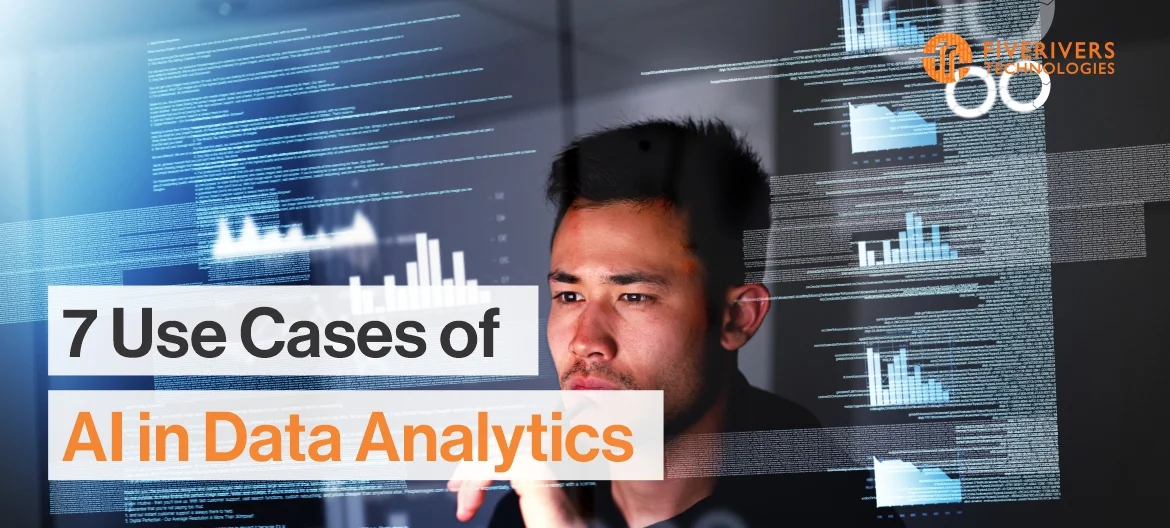These days, organizations are constantly seeking new ways to extract meaningful insights from the vast sea of information at their disposal. Enter Artificial Intelligence (AI), a game-changing force reshaping the landscape of data analytics. With its advanced algorithms and machine learning capabilities, AI has propelled data analysis to unprecedented levels of efficiency, accuracy, and innovation.
In this blog, we delve into the transformative role of AI in data analytics, exploring how it empowers organizations to uncover hidden patterns, make informed decisions, and drive strategic initiatives. From streamlining data processing and automating report generation to democratizing data access and enhancing fact-checking capabilities, AI revolutionizes every facet of the analytics journey.
But the impact of AI in data analytics doesn't stop there. We'll also explore real-world use cases spanning industries like healthcare, finance, and marketing, showcasing how AI-driven insights are driving tangible outcomes and reshaping business landscapes.
Key Takeaways:
- Utilizing AI within data analytics significantly enhances the efficiency of processing large volumes of data, empowering businesses to democratize access to valuable data insights
- AI in data analytics can help developers generate code for analyzing data sets, helps in debugging codes swiftly, creating synthetic data
- AI in data analytics can help health care organizations to accurately diagnose diseases, provide personalized treatment plans to patients, and predict disease progression
- With AI in data analytics, financial institutions can detect fraud, conduct efficient risk assessment, and helps in analyzing transaction data and customer behavior
- Future trends in AI in data analytics include AI-driven automation, federated learning and AI ethics and governance,
What is AI in Data Analytics?
Artificial Intelligence plays a pivotal role in data analytics by leveraging sophisticated algorithms and machine learning methodologies to scrutinize vast datasets, uncover valuable insights, and offer predictive analyses or actionable recommendations. Utilizing AI technologies like machine learning, natural language processing (NLP), deep learning, and computer vision, AI-powered data analytics automates and enhances the extraction of meaningful patterns and insights from data.
Importance of AI in Data Analytics
By 2030, AI will add $15.7 trillion to the world's GDP, hence, increasing it by 14%. So, with such a huge potential, it isn’t a surprise that businesses are finding AI increasingly important. Some benefits that businesses can leverage by incorporating AI in data analytics are:

- Efficiency and Speed
AI-powered data analytics significantly enhance efficiency and speed in processing vast amounts of data. Conventional data analysis methods typically demand significant time and resources. However, AI algorithms like machine learning and natural language processing enable rapid sifting through extensive datasets, swiftly identifying patterns, and extracting valuable insights at a notably accelerated pace. This speed allows organizations to make real-time decisions based on the most up-to-date information, gaining a competitive edge in dynamic markets.
- Fact Checking
In the era of big data, verifying the accuracy of information is paramount. AI technologies play a crucial role in fact-checking by automatically cross-referencing data from multiple sources and identifying inconsistencies or inaccuracies. Algorithms for natural language processing (NLP) can analyze textual data sourced from a variety of outlets, such as news articles, social media posts, and scientific papers, enabling the validation of claims or the debunking of misinformation. By leveraging AI for fact-checking, organizations can ensure the reliability and credibility of their analyses, ultimately fostering trust among stakeholders.
- Data Democratization
AI empowers organizations to democratize data access and analysis, making insights available to a broader range of users within the organization. Through intuitive AI-driven analytics platforms, employees across departments can access and interpret data without requiring advanced technical skills. By democratizing data, organizations foster a data-driven culture where decision-making is informed by insights rather than intuition. This democratization of data leads to improved collaboration, innovation, and agility, as teams can leverage AI tools to explore data independently and derive actionable insights relevant to their roles.
- Automated Report Generation
AI streamlines the process of report generation by automating repetitive tasks involved in data analysis and visualization. With AI-driven reporting tools, organizations can create customized reports tailored to specific requirements quickly and accurately. These tools can automatically extract insights, generate visualizations, and compile comprehensive reports, reducing the burden on data analysts and allowing them to focus on more strategic tasks.Moreover, AI algorithms possess the capability to adjust to evolving data patterns and continuously update reports in real-time. This ensures that decision-makers constantly have access to the most pertinent and up-to-date information.
7 Use Cases of AI in Data Analytics
As the popularity of AI in data analytics gathers steam, there are number of ways businesses can use it.

- Generating Code for Data Analysis
AI algorithms can assist in automating the generation of code for data analysis tasks. By analyzing patterns in data and understanding the desired outcome, AI can produce code snippets or even entire scripts tailored to specific analysis needs. This automation streamlines the process, reduces human error, and accelerates the development of analytical solutions. For instance, AI-powered platforms like DataRobot and H2O.ai offer functionalities to automatically generate code for predictive modeling tasks based on given datasets and objectives.
- Debugging the Code
AI can play a crucial role in debugging code used for data analytics. Through techniques like anomaly detection and predictive analytics, AI systems can identify errors, inconsistencies, or inefficiencies in the data analysis code. By analyzing historical data and runtime behaviors, AI algorithms can pinpoint problematic areas within the code, suggest optimizations, or even autonomously correct errors. Tools like DeepCode and Kite leverage machine learning to provide real-time code suggestions and bug detection, enhancing the efficiency and reliability of data analytics workflows.
- Data Analysis
AI significantly enhances the capabilities of traditional data analysis methods by enabling more sophisticated and accurate insights. Machine learning algorithms excel at efficiently processing extensive amounts of structured and unstructured data, revealing concealed patterns, correlations, and trends. Whether it's clustering similar data points, classifying data into categories, or predicting future outcomes, AI empowers data analysts to extract actionable insights more effectively. Platforms like Google Cloud's BigQuery ML and Microsoft Azure Machine Learning provide integrated tools for performing advanced data analysis tasks using AI techniques.
- Creating Synthetic Data
AI technologies facilitate the generation of synthetic data, which mimics the characteristics of real-world datasets without compromising privacy or security. Synthetic data is particularly valuable for training machine learning models when access to sensitive or limited data is restricted. AI-driven algorithms can generate synthetic datasets that preserve statistical properties, distributions, and correlations observed in the original data. This synthetic data can be used for various purposes, including model prototyping, testing, and validation. Tools like OpenAI's GPT-4 and synthetic data generation platforms like Synthetaic leverages AI to create realistic synthetic datasets across different domains.
- Health Care and Medical Research
AI-driven data analytics revolutionizes healthcare and medical research by facilitating precise diagnosis, personalized treatment plans, and predictive insights. Machine learning algorithms analyze patient data such as medical records, imaging scans, and genomic sequences to identify disease patterns, predict disease progression, and recommend optimal interventions. AI-powered medical imaging tools can assist radiologists and pathologists in interpreting scans and biopsies, improving diagnostic accuracy and patient outcomes. Additionally, AI facilitates drug discovery and development by analyzing large-scale biological and chemical datasets to identify potential candidates for new therapies.
- Financial Services and Banking
AI holds a crucial role in data analytics within the financial services sector, driving applications like fraud detection, risk assessment, and algorithmic trading. Machine learning algorithms analyze transaction data, customer behavior, and market trends to identify suspicious activities, detect anomalies, and mitigate financial risks in real-time. AI-driven chatbots and virtual assistants enhance customer service by providing personalized recommendations, answering queries, and facilitating seamless transactions. Furthermore, predictive analytics models leverage historical data to forecast market trends, optimize investment portfolios, and automate trading strategies, improving overall financial performance.
- Marketing
AI transforms data analytics in marketing by enabling targeted advertising, customer segmentation, and personalized recommendations. Machine learning algorithms analyze consumer behavior, demographic data, and purchasing patterns to identify relevant audience segments and tailor marketing campaigns accordingly.AI-driven recommendation engines, such as those employed by Amazon and Netflix, utilize data analytics to offer personalized suggestions for products, services, or content tailored to individual preferences and past interactions. Additionally, sentiment analysis tools process social media data to gauge public opinion, identify emerging trends, and assess brand sentiment, enabling marketers to adjust their strategies in real-time for maximum impact.
Future Trends in AI and Data Analytics
Future trends in AI and data analytics are poised to revolutionize industries across the board, offering unprecedented opportunities for innovation, efficiency, and insight. Here are some expanded insights into key areas of development:
AI-driven Automation
As AI algorithms become more sophisticated and capable, automation will extend to increasingly complex tasks. This includes not only routine administrative tasks but also decision-making processes in various domains such as finance, healthcare, and manufacturing. AI-driven automation will lead to significant increases in productivity and cost savings.
Federated Learning
Amid escalating worries surrounding data privacy and security, federated learning emerges as a promising approach. It allows the training of AI models on decentralized data sources while circumventing the centralization of sensitive information.
This technique allows multiple parties to collaboratively train a shared model while keeping their data local. Federated learning will facilitate advancements in healthcare, finance, and other sectors where data privacy is paramount.
AI Ethics and Governance
As AI technologies become more pervasive, there will be increasing scrutiny on their ethical implications and societal impacts. Organizations will need to develop robust frameworks for AI ethics and governance to ensure fairness, accountability, transparency, and inclusivity in AI systems. This includes addressing biases in data and algorithms, mitigating unintended consequences, and fostering responsible AI innovation.
Natural Language Processing (NLP)
NLP capabilities will continue to advance, enabling machines to understand and generate human language with increasing accuracy and nuance. This will drive innovations in conversational AI, virtual assistants, sentiment analysis, and language translation. NLP-powered applications will revolutionize customer service, content generation, and information retrieval across various industries.
AI for Healthcare
AI and data analytics will play a transformative role in healthcare, facilitating early disease detection, personalized treatment plans, and predictive analytics for patient outcomes. AI algorithms are poised to analyze extensive medical datasets, encompassing electronic health records, medical imaging, and genomic data. Their aim is to support clinicians in making diagnostic and treatment decisions. Moreover, wearable devices and remote monitoring systems powered by AI will facilitate proactive healthcare management and personalized interventions.
Quantum Computing and AI
The convergence of quantum computing and AI holds the potential to tackle computationally intensive problems that are currently intractable for classical computers. Quantum AI algorithms promise to revolutionize areas such as optimization, cryptography, and drug discovery by leveraging the unique properties of quantum systems. While still in its early stages, quantum AI research is advancing rapidly, with the potential to unlock groundbreaking capabilities in the future.
AI-driven Creativity
AI technologies are progressively utilized to enhance human creativity across diverse domains, encompassing art, music, literature, and design. Generative AI models can assist artists and designers in ideation, prototyping, and content creation, pushing the boundaries of what is creatively possible. Collaborations between humans and AI systems will lead to the emergence of entirely new forms of expression and innovation.
Responsible AI Deployment
As AI applications become more pervasive, there will be a growing emphasis on responsible AI deployment practices. This includes ensuring that AI systems are designed with considerations for safety, reliability, and societal impact. Organizations will need to invest in robust testing, validation, and monitoring processes to detect and mitigate potential risks associated with AI deployment. Additionally, interdisciplinary collaboration between technologists, policymakers, ethicists, and stakeholders will be essential to navigate the complex ethical and societal challenges posed by AI technologies.
How AI-powered Data Analytics Tools Can Help Businesses?
By integrating AI in data analytics tools, businesses can leverage the following benefits.
Data Processing and Analysis
Data analytics tools empowered by AI can rapidly handle extensive datasets sourced from diverse origins, encompassing both structured and unstructured data. These tools can identify patterns, trends, and correlations within the data, enabling businesses to gain valuable insights.
Predictive Analytics
AI algorithms can analyze historical data, enabling predictions regarding future trends, customer behavior, market shifts, and beyond. This empowers businesses to make well-informed decisions and formulate strategies to seize opportunities or mitigate risks.
Personalized Insights
AI can provide personalized insights tailored to specific business needs and goals. By understanding individual customer preferences, AI-powered analytics tools can recommend personalized products, services, and marketing strategies, improving customer engagement and satisfaction.
Automated Decision Making
AI can automate decision-making processes by applying predefined rules or learning from historical data. This enhances operational efficiency, minimizes human error, and liberates employees' time, allowing them to concentrate on tasks of greater significance.
Real-time Monitoring and Alerts
AI algorithms can continuously monitor data streams in real-time, detecting anomalies, deviations from expected patterns, or potential problems. Businesses can receive alerts and take proactive measures to address issues before they escalate.
Optimized Resource Allocation
AI-powered analytics tools can optimize resource allocation by identifying inefficiencies, optimizing workflows, and allocating resources more effectively. This can lead to cost savings and improved operational efficiency.
Competitive Advantage
By leveraging AI in data analytics, businesses can gain a competitive advantage by extracting insights faster, making better decisions, and staying ahead of market trends. This can lead to improved performance, increased market share, and greater profitability.
Final Word
The fusion of Artificial Intelligence with data analytics represents a watershed moment in the evolution of technology and business strategy. As we've explored throughout this blog, AI's ability to swiftly process vast datasets, extract actionable insights, and drive informed decision-making is unparalleled. From enhancing operational efficiency to enabling groundbreaking innovations, the impact of AI in data analytics permeates across industries and disciplines.
Looking ahead, the future of AI and data analytics holds boundless opportunities for advancement and transformation. As technologies continue to evolve and new challenges emerge, it's imperative that organizations embrace responsible AI deployment practices, uphold ethical standards, and foster collaborative ecosystems to maximize the potential of these powerful tools.
However, if you want an AI-driven data analytics solution for your business, you can reach out to FiveRivers Technologies, a top software development company, with over 20 years' experience in equipping brands with tailored software solutions.
FAQs
Which AI tool is Best for Data Analytics?
The following are the best AI tool for Data Analytics:
- AnswerRocket
- Microsoft Azure
- Akkio
- Tableau
- H2O.ai
- SiSense
- Kanaries RATH
- Polymer
- Power BI

